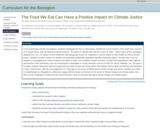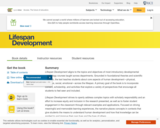
In this psychology real-life investigation, students investigate the food on their plates, identify the source location of the foods they consume on a regular basis, and calculate their carbon footprint. The goal is to identify their diet (its source of origin – where was it grown, packaged, shipped from, etc.), its impact on their subjective well-being (also known as "happiness"), and its impact on their health as well as climate justice. Students conduct research to identify one potentially problematic ingredient that they frequently ingest. The idea here is for the students to investigate their carbon footprint and reflect on their current dietary choices, and also consider food ingredient(s) that might be detrimental to their well-being, such as increasing the vulnerability to certain diseases such as COVID-19, cancer, diabetes, etc. The goal is to widen students' awareness and encourage them to make up their own minds about their dietary choices while considering new directions to take. Furthermore, with the encouragement of a TED Talk on the power of talking about climate change with others, students are asked to create/design an infographic to effectively engage with the larger community on the issues of climate change and climate justice, and then use the infographic to talk to friends and family about what you are learning about climate change and climate justice.
- Subject:
- Agriculture
- Applied Science
- Career and Technical Education
- Environmental Science
- Environmental Studies
- Health, Medicine and Nursing
- Psychology
- Social Science
- Material Type:
- Activity/Lab
- Provider Set:
- Teach the Earth
- Author:
- Deepti Karkhanis
- Date Added:
- 08/04/2022
